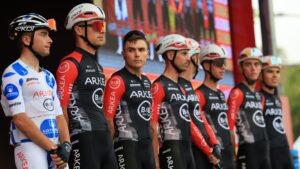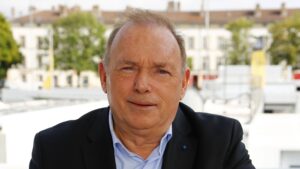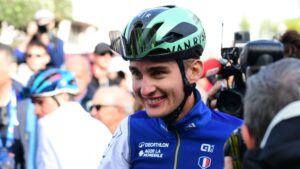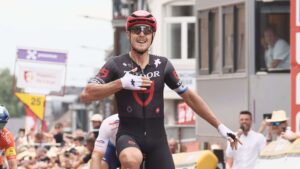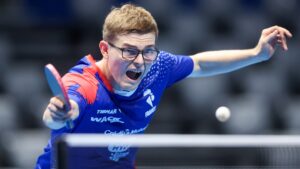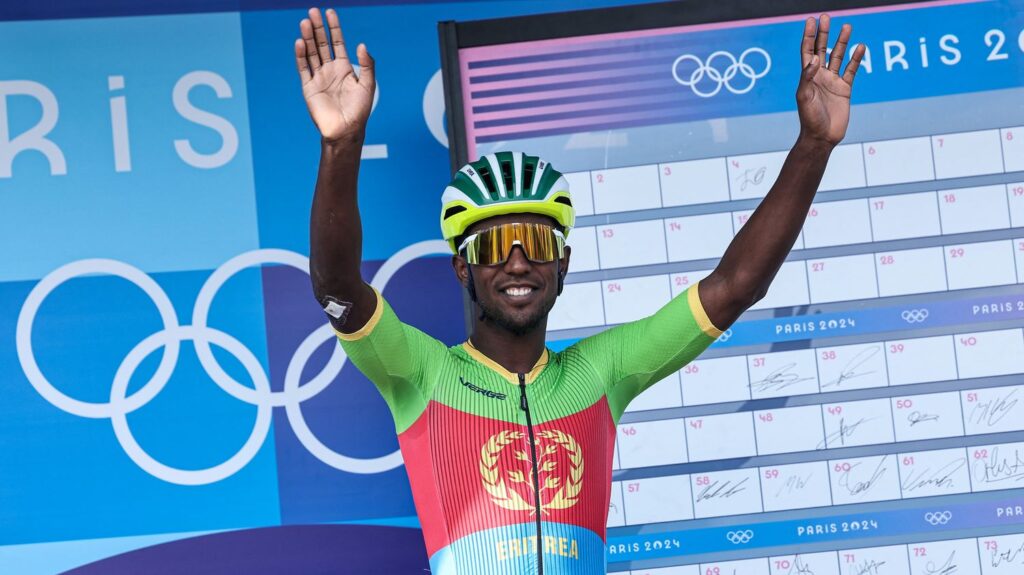
The cycling Worlds take place for the first time in Africa, in Rwanda, since September 21, and the Eritreans are those who are most likely to be well among the runners on the African continent.
From a “devil's cart” to a kings maker. Formerly nicknamed thus because feared by the Eritreans who did not conceive that a man could hold in balance on two wheels, the bicycle became the national sport of this small country of the horn of Africa, during the Italian colonization from 1869 to 1941. To the point of making today's best African country in cycling, with a standard holder, Biniam Girmay, the largest local star.
A welcome from a worthy of a rock star, with a huge crowd united in the capital Asmara to celebrate the green jersey of Biniam Girmay, the first African black runner to win a stage on the Tour de France, and to win a distinctive jersey. These scenes, in August 2024, testify to the passion of Eritreans for cycling. “With them, it's culturalunderlines David Louvet, French coach of the Rwandan team. Everywhere in Africa, king sport is football. But in Eritrea, it's bicycle. They are 15 years old ahead of us “.
Fifteen years in advance, and perhaps even more, as the bicycle has imposed itself in the daily life of the Eritreans since 1889, and the beginning of the Italian colonization of the country. “The Italians brought the bicycle, and in the 1930s, there were even competitions between the Eritrean natives and the Italiansexplains Habtom Weldeyowhannes, Eritrean journalist specialist in cycling for BBC Nairobi (Kenya). Now, no matter where you walk in the country, you will see that people have bikes, because they can afford to buy a car and we do not use motorcycle taxis, like in Rwanda for example, so it is a means of transport. And if you arrive in a neighborhood, you will see children organizing races between them in the street. This is how Biniam started “.
In addition to this rich history with the bicycle, local cyclists also take advantage of the relief of their country, with a capital, Asmara, which rises to 2,400 meters above sea level, and where a third of the 3.5 million Eritreans live. This topography facilitates the formation of good climbers, which have the opportunity, more than elsewhere in Africa, to gauge itself during competitions. “Their federation has a real calendar, with a race every week, for all categories. While elsewhere, this is not the case, and if you do not have a race, you have no goal”underlines Jean-Pierre Van Zyl, director of the Development Satellite of the International Cycling Union (UCI) in South Africa, by which Daniel passed in particular Teklehaimanot, first African to put on the polka dot jersey on the Tour de France in 2015, and star in his country.
“Each year, we have new talented runners who stand out, that children can see on TV, it makes them want to become like them”Samson Solomon, coach of the national team. And Even if the country does not have so many clubs or training center for cycling, young people participate individually in these numerous races. “”The bike is very expensive, but when they see Biniam or others, they see cycling as an opportunity to have a good future, so families are ready to make sacrifices to offer one to their children “explain Habtom Weldeyowhannes.
It must be said that the standard of living is very low in Eritrea. This country is the 175th out of 193 to the human development index, which combines the level of GDP per capita, its life expectancy at birth and its level of access to education. “”In Eritrea, runners cannot live cycling. We do not have a professional continental team, so money, possibly earned on races, just serves as pocket money. And when they run for the national team, they are paid 200-300 dollars (between 170 and 255 euros)no more than that “recognizes Samson Solomon.
/2025/03/15/dsc-0113-67d5655f1d5bc860216015.jpg)
This lack of a professional continental team, for the country of cycling in Africa, while Rwanda has three for example (and there are two in Morocco, one in Egypt and one in Algeria), Habtom Weldeyowhannes, the cycling specialist journalist for BBC Nairobi, does not explain it: “I do not know if it is a story of means or will. However, the best Eritrean clubs offer bikes and a nutrition of quality greater than certain professional continental teams, in particular because the government distributes important aid for cycling “.
Only the lucky ones, who succeed in being recruited by an international professional team, live on cycling. They are 18 this season, including four in World Tour, the first level of world cycling: Biniam Girmay (Intermarché-Wanty), Natnael Tesfatsion (Movistar), Amanuel Ghebreigzabhier (Lidl-Trek) and Henok Mulubrhan (XDS Astana). Cycling can also represent, for them, a means of leaving Eritrea, directed with an iron fist by Issayas Afewerki since independence in 1993, and whose borders are closed. It is not uncommon for Eritrean athletes to defection and disappear during internships or competitions abroad. Since 2009, more than 60 football players have, for example, fled, and the national team has forfeited for qualifications at the 2026 World Cup, in order to prevent some of its footballers from taking advantage of the country in turn.
“They only have two options to get out of the country: either find a club outside Eritrea, or represent the national team on towers like in Rwanda or Algeria. This is why everyone wants to integrate the national team, to go abroad and be spotted.”
Habtom WeldeyowhannesIn Franceinfo: Sport
Biniam Girmay has gone through the World Cycling Center, UCI training structure in Switzerland. “It opened doors to him, he was able to participate in competitions with European teams, and that's how he progressedexplains Samson Solomon, his former coach and coach. In Eritrea, he was already a good sprinter and a good climber, but his managers in Europe identified that he would be a better sprinter and trained him for that “, Which makes it a unique talent in a country of climbers.
Unfortunately for the best African runner in the peloton, the journey of the first world championships in Africa is intended for climbers. But he still decided to participate. “”Each year, the world championship is my only opportunity to wear the Eritrea jersey because you never really know when the African championships take place, we are often warned two weeks in advance, it is impossible to plan … It's always nice to be able to represent your country. I chatted with my national team, they need me there, I'm happy to go there, ” He said at a press conference before the Quebec Grand Prix, earlier in September. He hopes to be able to slip into a breakaway, to show the jersey of his country, and try to finish the race “Because it would not make sense if no African runner managed”.
